In a recent tweet, @harvardmed professor and controversial longevity guru @davidasinclair claims:
"It is incontrovertible that skipping meals while maintaining adequate nutrition is not only good for you but will make you live longer"
But what do the data say?
"It is incontrovertible that skipping meals while maintaining adequate nutrition is not only good for you but will make you live longer"
But what do the data say?

First, some context.
On the @joerogan podcast and others, Sinclair claims that he only eats a single meal after 6pm, and explains that this is optimal because humans are made more resilient by doing such a thing.
On the @joerogan podcast and others, Sinclair claims that he only eats a single meal after 6pm, and explains that this is optimal because humans are made more resilient by doing such a thing.
This answer, while it makes for an interesting story for a podcast, is only a hypothesis. So what *do* the data say?
To try to answer this question, @davidasinclair tries to follow this tweet up with the following paper.
Let us examine it.
To try to answer this question, @davidasinclair tries to follow this tweet up with the following paper.
Let us examine it.
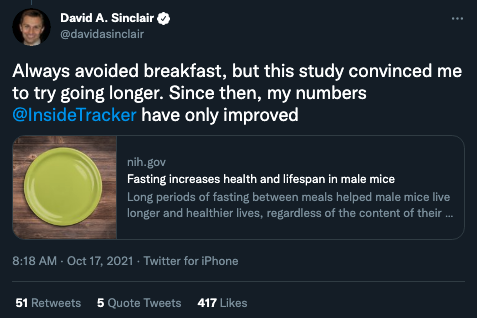
This mouse study deprived mice of food for 21 hours out of each day.
The mice lived on average 11% longer. This is impressive.
pubmed.ncbi.nlm.nih.gov/30197301/
The mice lived on average 11% longer. This is impressive.
pubmed.ncbi.nlm.nih.gov/30197301/
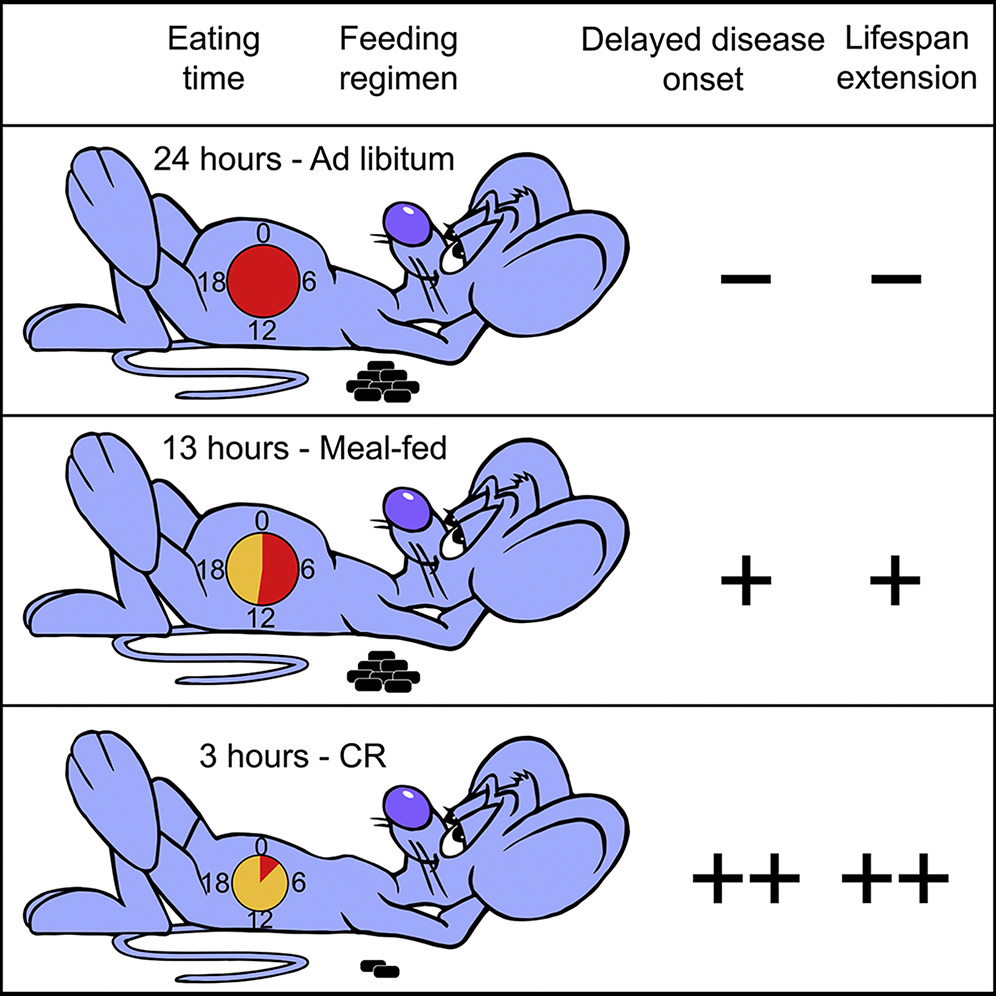
But to place this in perspective, it is important to understand that mice die after about 3 days of food deprivation, equivalent to about a month in humans.
In other words, the mice in this study were subjected to the metabolic equivalent of about a week of fasting every day.
In other words, the mice in this study were subjected to the metabolic equivalent of about a week of fasting every day.
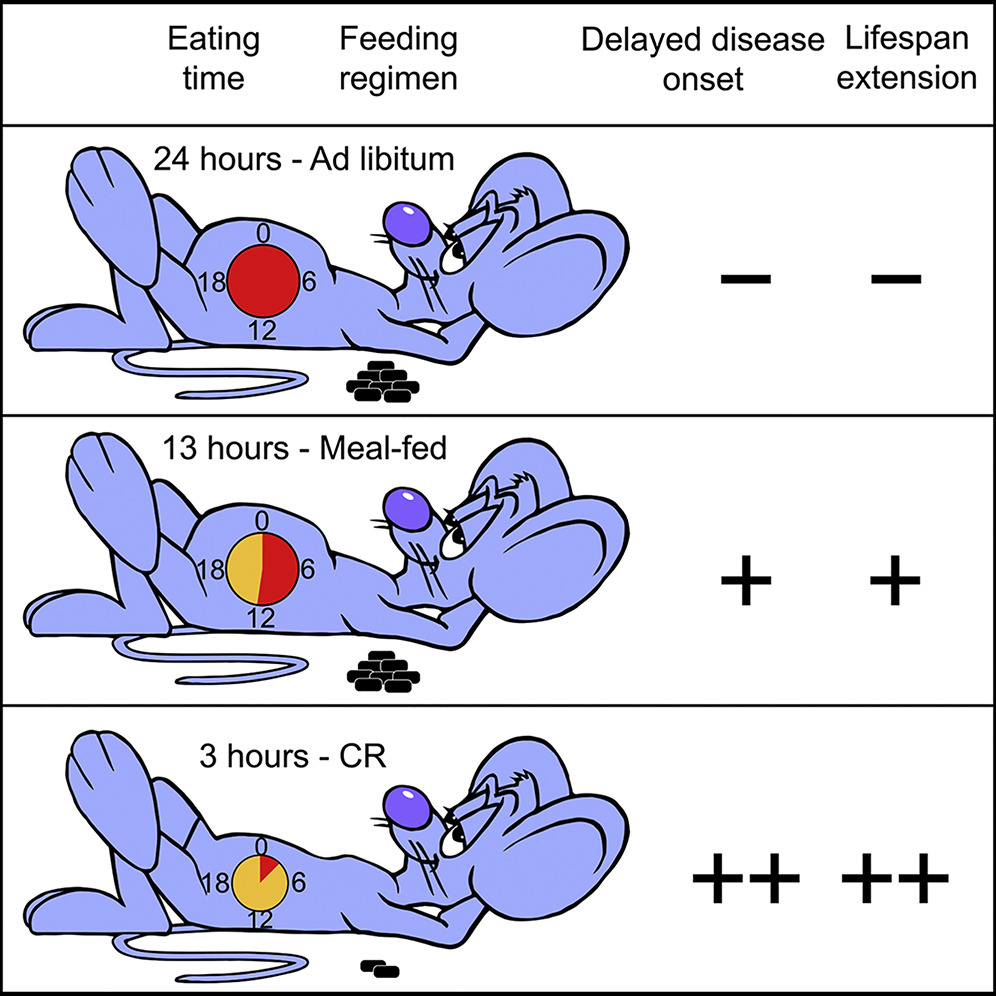
What's more, the mice in this study were subjected to profound calorie restriction, as indicated by the red line in this graph.
So eating for just three hours per day was not the only effect: the mice also lost a lot of weight!
So eating for just three hours per day was not the only effect: the mice also lost a lot of weight!

Perhaps even more surprisingly, despite losing a similar amount of weight as traditionally calorie-restricted mice, the fasted mice gained only 11% in average lifespan, while the calorie-restricted mice gained 28%... 

This suggests that fasting might have *negatively* affected the health of the mice, to cause less benefit than simple calorie restriction at the same body weight did.
😬
😬

However, mice are mice, and humans are humans.
What do the human data look like?
What do the human data look like?
One study published earlier this year, looking at the form of intermittent fasting practiced by Dr. Sinclair, found metabolic deterioration from the kind of late-day fasting advocated and practiced by Sinclair.
pubmed.ncbi.nlm.nih.gov/33259790/
pubmed.ncbi.nlm.nih.gov/33259790/
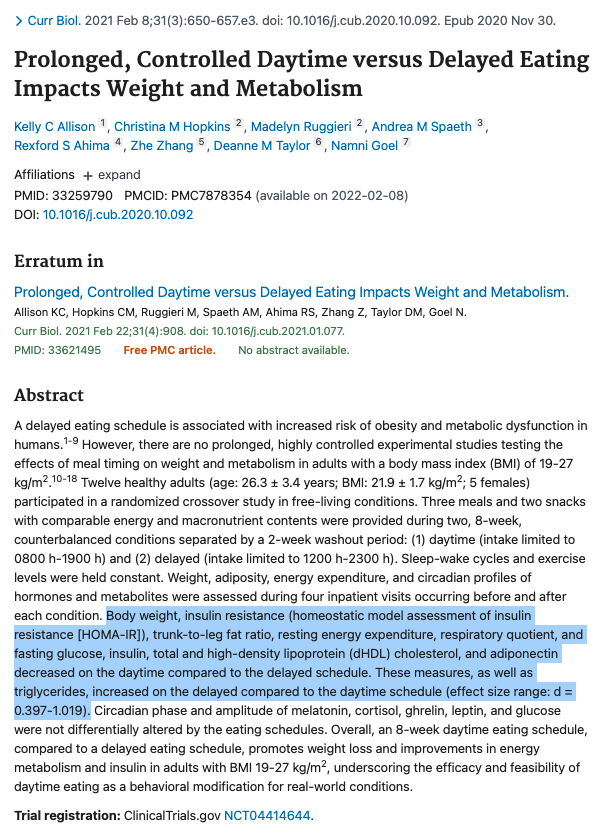
Meanwhile, the opposite form of fasting, not advocated or practiced by Sinclair, which focused on eating most calories earlier in the day, was found to be associated with metabolic improvements.
pubmed.ncbi.nlm.nih.gov/33259790/
pubmed.ncbi.nlm.nih.gov/33259790/
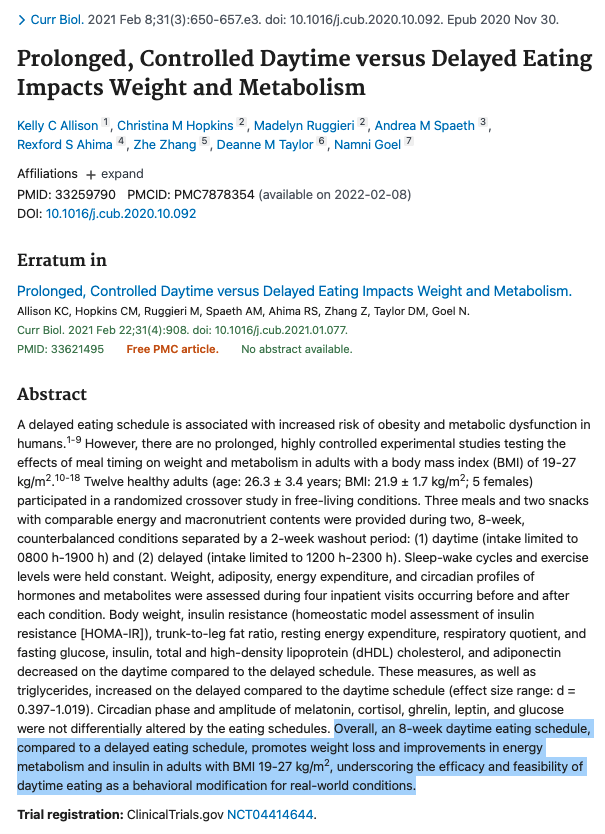
Well-controlled metabolic ward studies, providing a test meal earlier vs. later in the day, saw an acute deterioration in metabolic function for the meal given later in the day
tandfonline.com/doi/full/10.10…
tandfonline.com/doi/full/10.10…
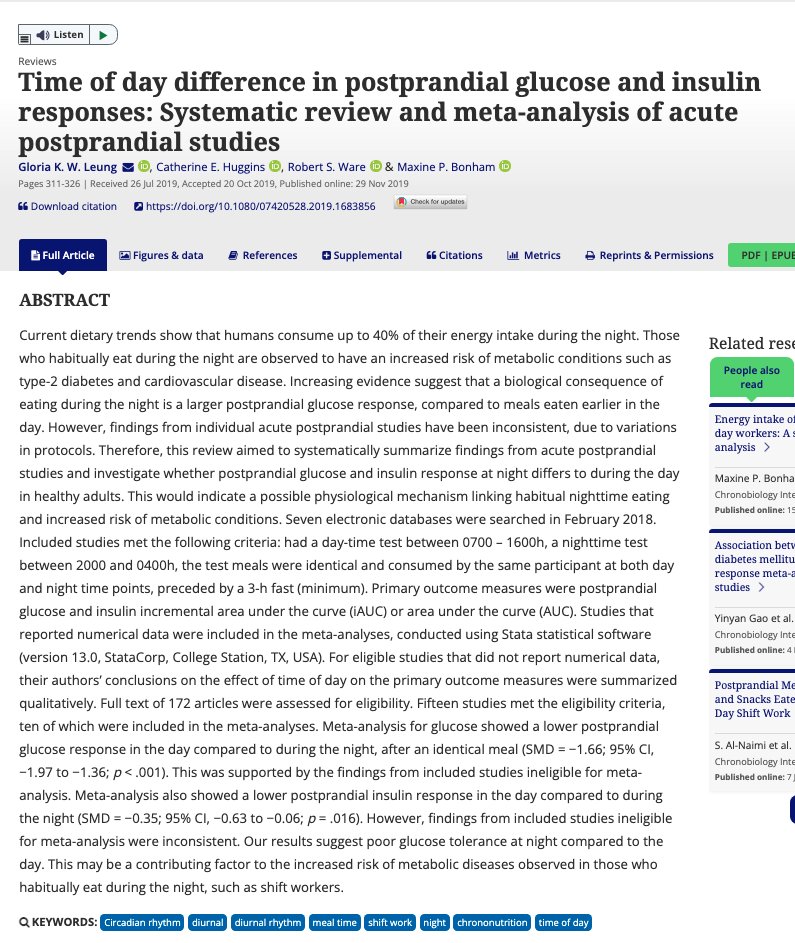
These results do not bode well for the metabolic impact of the type of fasting now being broadly advocated by Dr. Sinclair.
That said, the results from the mouse study we saw earlier suggested that intermittent fasting might cause significant weight loss in mice. Again, what about humans?
A recent meta-analysis saw no difference in weight or blood glucose between those using intermittent fasting or traditional calorie restriction.
liebertpub.com/doi/abs/10.108…
liebertpub.com/doi/abs/10.108…
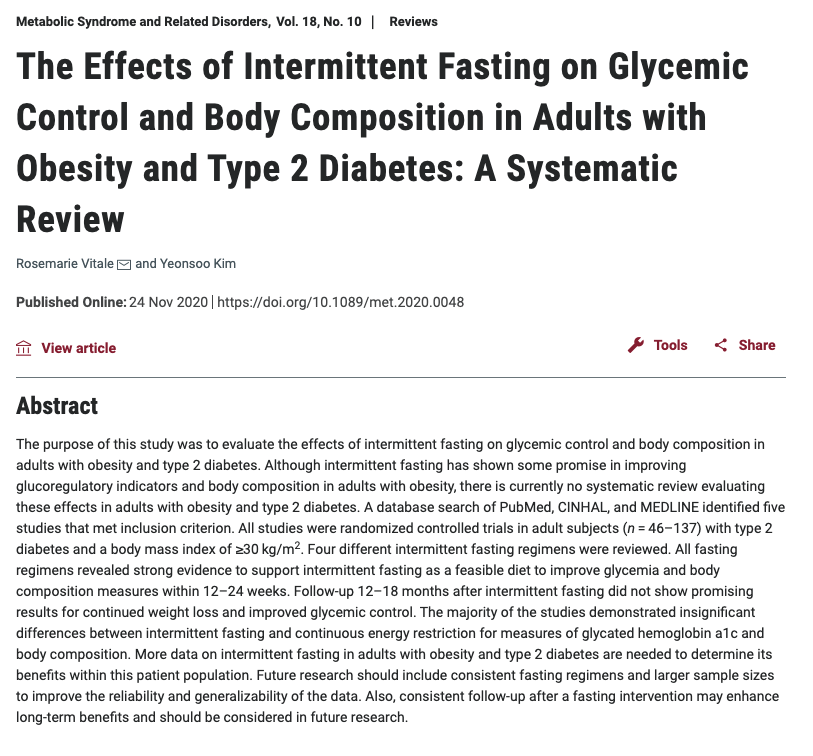
Indeed, the largest time-restricted feeding trial to date, conducted by @ethanjweiss and @Dy1anLowe, showed no difference in weight loss between those randomized to time-restricted feeding and the control group: consistently-timed meals.
jamanetwork.com/journals/jamai…
jamanetwork.com/journals/jamai…

In fact, in this trial, there was troubling evidence of increased muscle loss on the time-restricted feeding/intermittent fasting regimen.
jamanetwork.com/journals/jamai…
jamanetwork.com/journals/jamai…
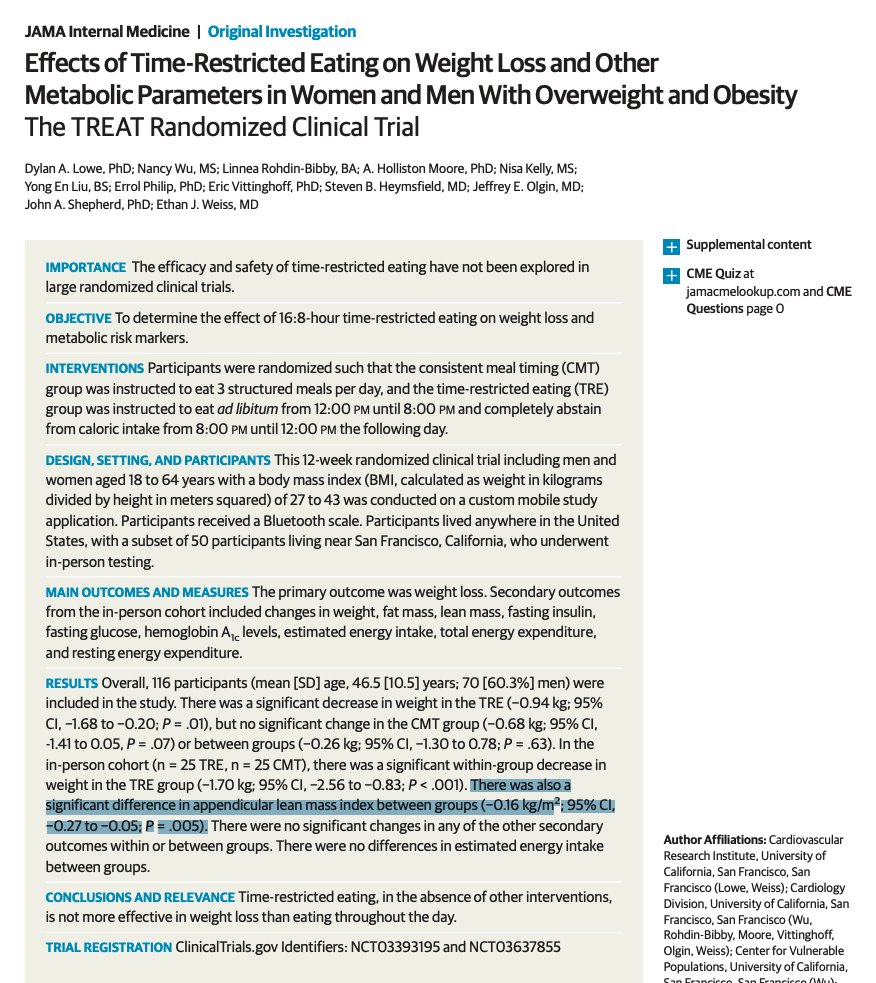
These results persuaded @ethanjweiss, the principal investigator of the trial and long-time faster, to stop using time-restricted feeding.
Learn more about this trial from Ethan on @BioLayne's podcast.
podcasts.apple.com/us/podcast/int…
Learn more about this trial from Ethan on @BioLayne's podcast.
podcasts.apple.com/us/podcast/int…
The waterfall plots for this trial are illustrative.
They indicate that while on average there was no difference, some people lost more weight, and others gained weight.
Interestingly, the people with the largest losses were in the control group.
jamanetwork.com/journals/jamai…
They indicate that while on average there was no difference, some people lost more weight, and others gained weight.
Interestingly, the people with the largest losses were in the control group.
jamanetwork.com/journals/jamai…
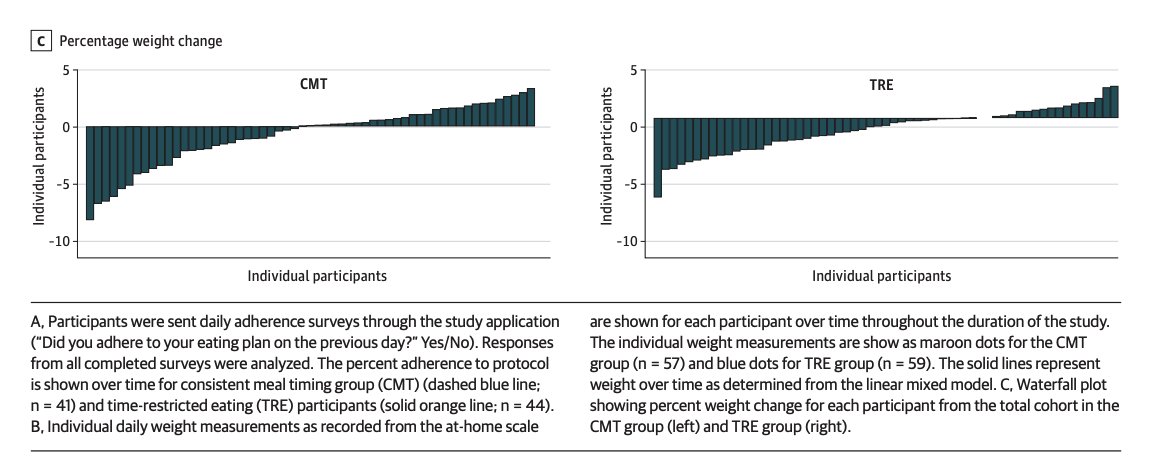
The diversity represents effects due to response differences to the intervention or to effects due to random factors not caused by the intervention (e.g., other lifestyle changes).
This explains Sinclair's anecdote, and indeed, all anecdotes.
This explains Sinclair's anecdote, and indeed, all anecdotes.
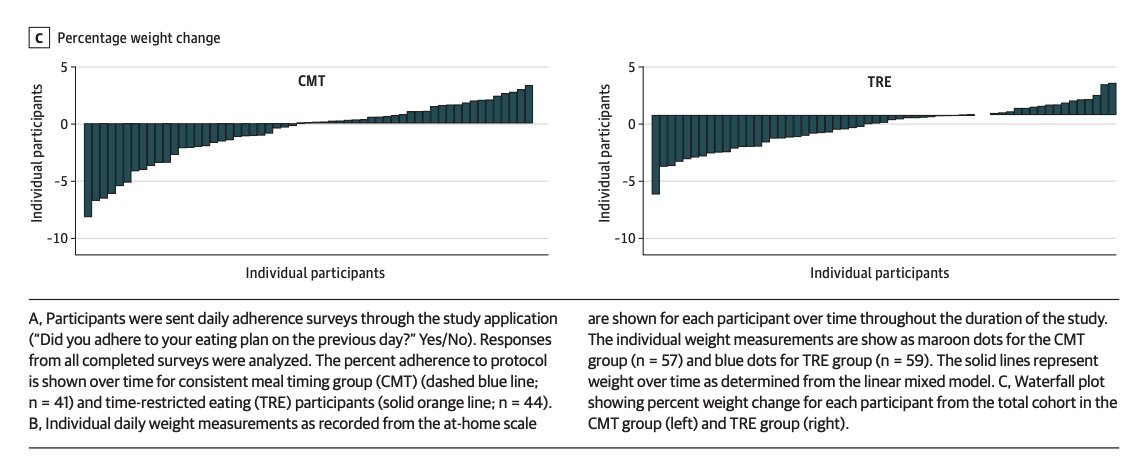
Even if an intervention does not work at all, there will always be people who swear by it, and this has been the case from time immemorial.
When Sinclair was challenged on his use of a mouse study by scientist and National Academy of Sciences member @JohnSpeakman4 for using a mouse study to make a strong "incontrovertible" claim about human health, Sinclair had the following response: 
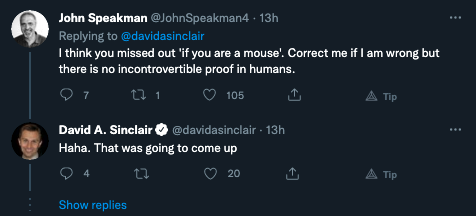
This reply to @JohnSpeakman4 seems a little inappropriate and unprofessional for a @harvardmed professor who is making strong health claims to nearly 200K followers, many of whom are taking him very seriously.
More troubling are Sinclair's repeated endorsements of his company @InsideTracker. 
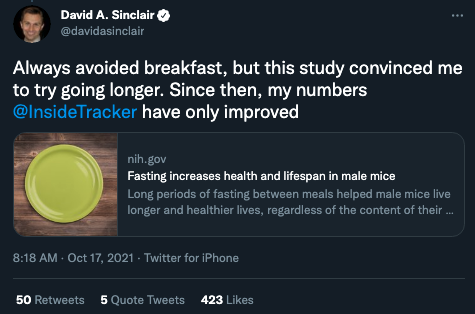
Sinclair has repeatedly made false and arguably fraudulent claims about what the technology from this company can achieve.
For example, see:
For example, see:
https://twitter.com/healthmisinfo/status/1416209047791960064
So, this misrepresentation of the science of fasting is just one more false, misleading, or overhyped claim from Dr. Sinclair--these days apparently frequently made to promote his new company.
Do not be mistaken: promotion of this company, for which it seems he will say almost anything, is the context and angle of his fasting tweet, which, as we have seen from a look at the actual science in the field, is very far from "incontrovertible".
We request that if you see Dr. Sinclair making any more misleading or false health claims, please DM us here on Twitter or at @healthmisinfo on Instagram so that we can try to address them.
• • •
Missing some Tweet in this thread? You can try to
force a refresh













